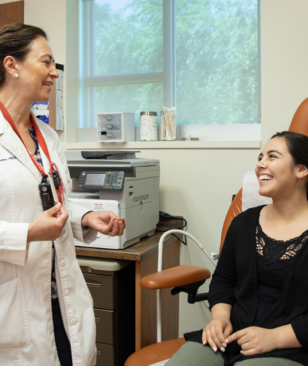 Small practices are often the sole providers of care in high-poverty areas, serving uninsured, underinsured, ‘safety-net,’ and low- and moderate-income patients who are covered by government-sponsored health insurance. However, they face unique challenges in implementing new programs and screenings due to limited resources.
Small practices are often the sole providers of care in high-poverty areas, serving uninsured, underinsured, ‘safety-net,’ and low- and moderate-income patients who are covered by government-sponsored health insurance. However, they face unique challenges in implementing new programs and screenings due to limited resources.
Earlier this year, Primary Care Development Corporation received a California state grant to raise awareness and increase screening of Adverse Childhood Experiences (ACEs). PCDC’s Clinical and Quality Partners team offered six webinars and a published whitepaper focused on addressing ACEs in small practices across the state of California.
We speak with PCDC’s Yael Lipton and Anuja Solanki to learn more about ACEs and how the new project will support small practices in their capacity to address ACEs, and improve the health of their communities.
What are ACEs?
Adverse Childhood Experiences (ACEs) include abuse, neglect, and/or household dysfunction that children may experience from birth to age 18. The abuse can be physical, emotional, or sexual; and neglect can be physical or emotional. Household dysfunction can be parental incarceration, mental illness, substance use, parental separation or divorce, and intimate partner violence.
Why screen for ACEs?
Children who experience ACEs are more likely to suffer from physical and emotional challenges during childhood. As adults, they are more likely to develop many of the most common chronic physical and behavioral health conditions that are associated with 9 out of 10 of the leading causes of death in America (i.e., asthma, diabetes, heart disease, stroke, etc.). By increasing screening for ACEs and addressing the impacts of the associated trauma, small practices can better meet the needs of patients and families, while improving health trajectories.
Why California?
The state of California has made the unprecedented decision to support Medi-Cal providers in screening for ACEs though reimbursement and training, and technical assistance offered by the ACEs Aware program. This statewide effort is one of the largest in history to recognize the impact ACEs have on health. PCDC is proud to contribute to this initiative, promoting the health and wellbeing of communities throughout the state.
Tell us more about PCDC’s ACEs Webinar Series, who is the series best suited for?
In this free six-part webinar series, PCDC’s small practice and trauma-informed care experts will guide participants through screening for ACEs and providing trauma-informed care from a small practice perspective. We invite health care professionals and stakeholders interested in enhancing trauma-informed care and ACEs screening in small and medium sized community medical practices where there are fewer than 6-7 medical providers. We will also offer optional follow-up office hours. Topics include setting the stage for trauma-informed care, clinical encounters, staff wellness, and more.

 Small practices are often the sole providers of care in high-poverty areas, serving uninsured, underinsured, ‘safety-net,’ and low- and moderate-income patients who are covered by government-sponsored health insurance. However, they face unique challenges in implementing new programs and screenings due to limited resources.
Small practices are often the sole providers of care in high-poverty areas, serving uninsured, underinsured, ‘safety-net,’ and low- and moderate-income patients who are covered by government-sponsored health insurance. However, they face unique challenges in implementing new programs and screenings due to limited resources.